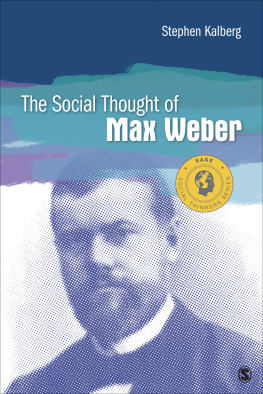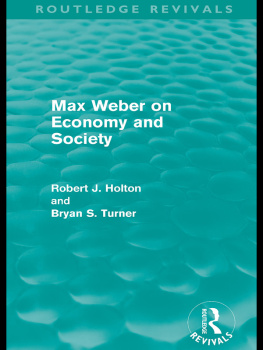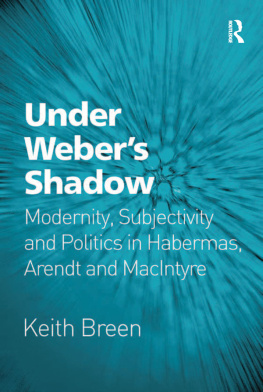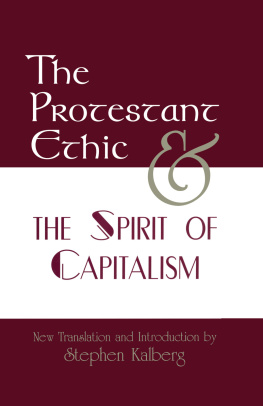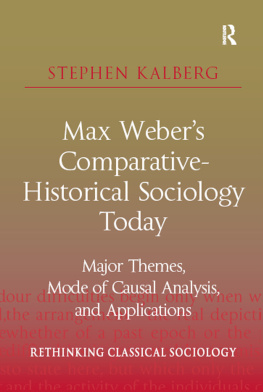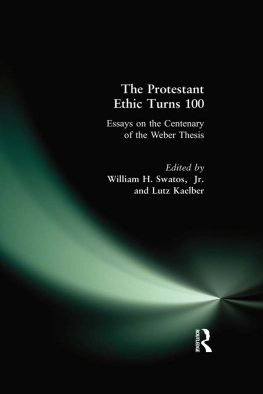
MAX WEBERS COMPARATIVE-HISTORICAL SOCIOLOGY TODAY
Rethinking Classical Sociology
Series Editor: David Chalcraft, University of Derby, UK
This series is designed to capture, reflect and promote the major changes that are occurring in the burgeoning field of classical sociology. The series publishes monographs, texts and reference volumes that critically engage with the established figures in classical sociology as well as encouraging examination of thinkers and texts from within the ever-widening canon of classical sociology. Engagement derives from theoretical and substantive advances within sociology and involves critical dialogue between contemporary and classical positions. The series reflects new interests and concerns including feminist perspectives, linguistic and cultural turns, the history of the discipline, the biographical and cultural milieux of texts, authors and interpreters, and the interfaces between the sociological imagination and other discourses including science, anthropology, history, theology and literature.
The series offers fresh readings and insights that will ensure the continued relevance of the classical sociological imagination in contemporary work and maintain the highest standards of scholarship and enquiry in this developing area of research.
Also in the series:
The Social Thought of Talcott Parsons Methodology and American Ethos
Uta Gerhardt
ISBN 978-1-4094-2767-4
Transatlantic Voyages and Sociology The Migration and Development of Ideas
Cherry Schrecker
ISBN 978-0-7546-7617-1
Critical Social Theory and the End of Work
Edward Granter
ISBN 978-0-7546-7697-3
Max Webers Comparative-Historical Sociology Today
Major Themes, Mode of Causal Analysis, and Applications
STEPHEN KALBERG
Boston University, USA
First published 2012 by Ashgate Publishing
Published 2016 by Routledge
2 Park Square, Milton Park, Abingdon, Oxon OX14 4RN
711 Third Avenue, New York, NY 10017, USA
Routledge is an imprint of the Taylor & Francis Group, an informa business
Copyright Stephen Kalberg 2012
Stephen Kalberg has asserted his right under the Copyright, Designs and Patents Act, 1988, to be identified as the author of this work.
All rights reserved. No part of this book may be reprinted or reproduced or utilised in any form or by any electronic, mechanical, or other means, now known or hereafter invented, including photocopying and recording, or in any information storage or retrieval system, without permission in writing from the publishers.
Notice:
Product or corporate names may be trademarks or registered trademarks, and are used only for identification and explanation without intent to infringe.
British Library Cataloguing in Publication Data
Kalberg, Stephen.
Max Webers comparative-historical sociology today : major themes, mode of causal analysis, and applications. (Rethinking classical sociology)
1. Weber, Max, 18641920. 2. Historical sociology. 3. SociologyComparative method.
I. Title II. Series
301.0722-dc23
Library of Congress Cataloging-in-Publication Data
Kalberg, Stephen.
Max Webers comparative-historical sociology today : major themes, mode of causal analysis, and applications / by Stephen Kalberg.
p. cm. (Rethinking classical sociology)
Includes bibliographical references and index.
ISBN 978-1-4094-3223-4 (pbk. : alk. paper)
1. Weber, Max, 1864-1920. 2. SociologyGermanyHistory.
3. SociologyHistory. I. Title.
HM479.W42K37 2011
301.0943dc23
2011039524
ISBN 9781409432234 (pbk)
To my teachers:
Lewis A. Coser
Benjamin Nelson
Guenther Roth
Friedrich H. Tenbruck
The value-spheres intersect and become entangled in almost every single important position one takes. (Weber 1949b: 18/507; transl. alt.)
Of course the religiously determined organization of life is itself profoundly influenced by economic and political factors operating within given geographical, political, social, and national boundaries. We should lose ourselves in these discussions if we tried to demonstrate these dependencies in all their singularities. (1946d: 268/238-9)
the typical deportment of the mystic is one of a specifically broken humility, a minimization of action Inner-worldly asceticism, on the contrary, testifies to itself through action. The conduct of the mystic to the inner-worldly ascetic is an indolent enjoyment of self; the conduct of the ascetic (acting in the world) to the mystic is an entanglement in machinations in the world alien to God combined with complacent self-righteousness. (1946b: 326/539; transl. alt.)
the dedication to work in the manner of a calling has in the past constituted one of the characteristic components of our [modern] capitalist economic culture. It remains so even today. What interests us here is precisely the ancestral lineage of that irrational element which lies in this, as in every, conception of a calling. (2011: 98/62)
Contents
Max Weber (18641920), the son of an influential member of the Reichstag and an activist Protestant mother, came to maturity in Berlin in an intellectually lively home frequently visited by the Bismarckian eras leading politicians and intellectuals. After receiving an outstanding secondary education in languages, history, and the classics, he studied law, economics, history, and philosophy in Heidelberg, Strasbourg, Berlin, and Gttingen.
Although his first appointments at Freiburg University (1894) and Heidelberg University (1897) were in Economics departments, he is best known today as one of the three major founders of modern Sociology and as an intellectual giant of interdisciplinary scholarship in the social sciences. His projects expanded far beyond the range of themes commonly explored by researchers past and present.
He investigated, for example, the distinctiveness of Japanese feudalism compared to Russian, English, German, and Islamic feudalism, the possibilities for democracy in Russia, the productivity of Eastern European and German farm workers, exemplary prophets in India and ethical prophets in ancient Israel, and the ways in which persons pursue high social status even in egalitarian and democratic societies. Although ranging far and wide, Webers research evidences coherent procedures and strategies, as will become apparent in this volume. It also manifests an overarching concern.1
He sought to explore the origin of the modern West and the direction of its further development. Will its trajectory lead to a new civilization inhabited by citizens in possession of ethical ideals and notions of individual and civic responsibility? Will compassion become circumscribed, indeed to such an extent that the future will resemble a steel-hard casing dominated by impersonal and instrumental relationships? While welcoming the opportunities offered by the modern age for a burgeoning of individualism, higher standards of living, and an escape from the feudal chains of the past, Weber saw few firm guidelines for persons who sought to establish a comprehensive, value-based meaning for their lives (2005: 25172). How, he queried, shall we live with dignity in the new era on the horizon?


